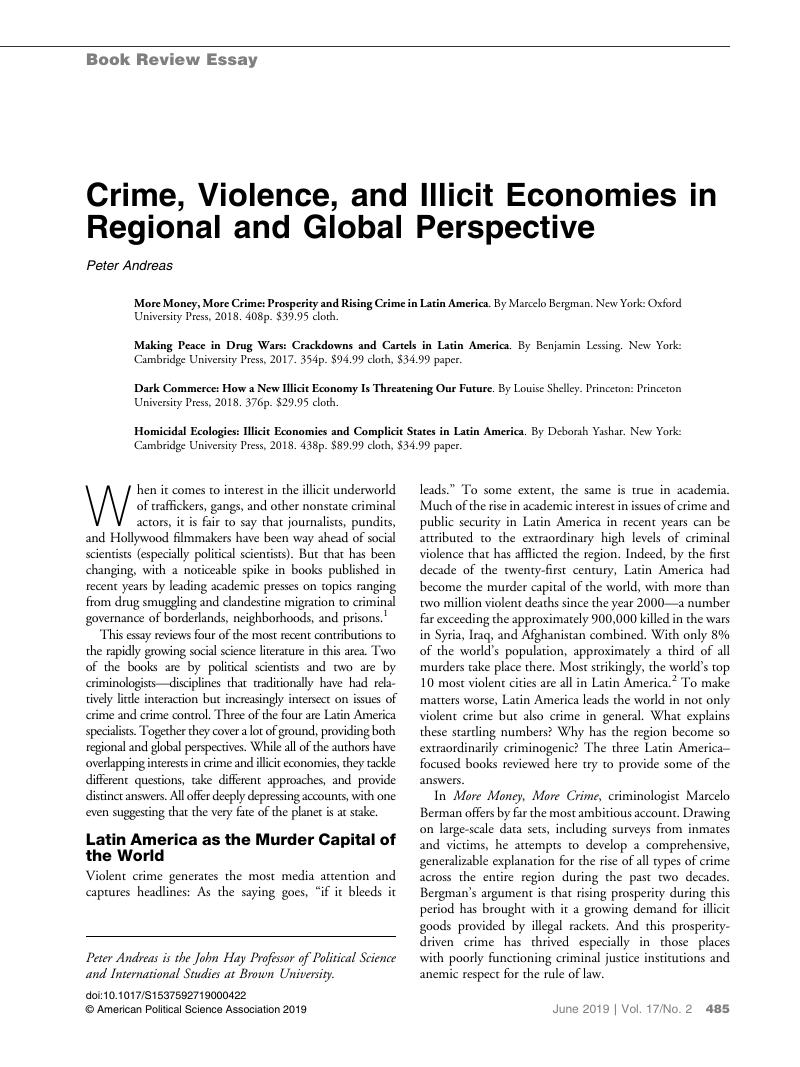Published online by Cambridge University Press: 13 May 2019

1 A small sampling of books published in the past five years alone includes Graham Denyer Willis, The Killing Consensus: Police, Organized Crime, and the Regulation of Life and Death in Urban Brazil (Oakland: University of California Press, 2015); Noelle Brigden, The Migrant Passage: Clandestine Journeys from Central America (Ithaca, NY: Cornell University Press, 2018); David Skarbek, The Social Order of the Underworld: How Prison Gangs Govern the American Penal System (New York: Oxford University Press, 2014); Angelica Duran Martinez, The Politics of Drug Violence: Criminals, Cops, and Politicians in Colombia and Mexico (New York: Oxford University Press, 2018); Annette Idler, Borderland Battles: Violence, Crime, and Governance at the Edges of Colombia’s War (New York: Oxford University Press, 2019); Rebecca Galemba, Contraband Corridor: Making a Living at the Mexico-Guatemala Border (Stanford, CA: Stanford University Press, 2017); Aisha Ahmad, Jihad & Co.: Black Markets and Islamist Power (New York: Oxford University Press, 2017); and Enrique Desmond Arias, Criminal Enterprises and Governance in Latin America and the Caribbean (New York: Cambridge University Press, 2018).
2 David Luhnow, “Latin America Is the Murder Capital of the World,” Wall Street Journal, 20 September 2018.
3 Stathis Kalyvas, The Logic of Violence in Civil War (New York: Cambridge University Press, 2006).
4 Charles Tilly, “War Making and State Making as Organized Crime,” in Peter B. Evans, Dietrich Rueschemeyer, and Theda Skocpol, eds., Bringing the State Back In (Cambridge: Cambridge University Press, 1985).
5 For an earlier Tilly-inspired account of state making through the policing of illicit economic activities, see Peter Andreas, Smuggler Nation: How Illicit Trade Made America (New York: Oxford University Press, 2013).
6 Julie Marie Bunck and Michael Ross Fowler, Bribes, Bullets, and Intimidation: Drug Trafficking and the Law in Central America (University Park: Pennsylvania State University Press, 2012).
7 Moises Naim, Illicit: How Smugglers, Traffickers, and Copycats are Hijacking the Global Economy (New York: Doubleday, 2006).
8 Social scientists have devoted too little attention to this area. But see Ieva Jusionyte, Savage Frontier: Making News and Security on the Argentine Border (Oakland: University of California Press, 2015).